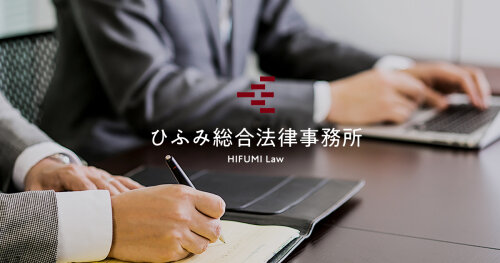Best General Litigation Lawyers in Tokyo
Share your needs with us, get contacted by law firms.
Free. Takes 2 min.
List of the best lawyers in Tokyo, Japan
About Litigation Law in Tokyo, Japan
Litigation in Tokyo, Japan, revolves around resolving disputes through the judicial system. Tokyo, being the economic hub of Japan, witnesses a high volume of litigation cases ranging from commercial disputes, personal injury claims, employment disagreements, to family and property law issues. The litigation process in Japan is distinct, often characterized by a more extended period to reach a resolution compared to other jurisdictions. The legal system in Japan is primarily civil law-based, influenced by the German and French systems, focusing on codified statutes. The system tends to encourage settlement through mediation before reaching the court stage.
Why You May Need a Lawyer
Litigation can be challenging to navigate without legal advice, especially if you're unfamiliar with the legal landscape in Tokyo. Common situations where legal help might be necessary include:
- Business disputes involving breach of contract, trade secrets, or intellectual property issues.
- Employment-related disputes, such as wrongful termination or workplace discrimination.
- Family law cases, including divorces, child custody, and inheritance issues.
- Personal injury claims due to accidents or negligence.
- Property and real estate disputes over ownership or leasing agreements.
- Defamation cases or disputes involving media and privacy laws.
A qualified lawyer can provide guidance, represent your interests in negotiations, and advocate for you in court if necessary.
Local Laws Overview
In Tokyo, the Civil Procedure Code governs litigation processes, offering a structured approach to resolving disputes. Key aspects include:
- The importance of written documents: Evidence presented in trials is heavily based on documentary evidence.
- Pre-trial procedures: Often involve mediation and conciliation to encourage settlement before formal trial proceedings.
- Statute of limitations: Timelines within which a case must be filed, which vary by case type (typically three to ten years).
- Judicial Panel: Most cases are overseen by a panel of judges rather than a jury.
- Appeals system: Decisions can be appealed, but the number of appeal rounds is limited compared to some common law countries.
- Cost: Litigation can be expensive, and the losing party may be required to pay some or all of the legal costs of the prevailing party.
Frequently Asked Questions
What is the first step if I want to pursue litigation in Tokyo?
The initial step is to consult with a lawyer specializing in the type of dispute you're involved in. They will help evaluate your case's strengths and weaknesses.
How long does a litigation process generally take in Tokyo?
The duration varies depending on the complexity of the case, but litigation can often take several months to a few years from filing to resolution.
Can I represent myself in court?
Yes, you can represent yourself, although it is advisable to have legal representation to navigate the complexities of the law effectively.
What are the costs involved in litigation?
Costs can include court fees, attorney fees, and other associated expenses such as expert witness fees. The overall costs can be significant, depending on the case's complexity.
Is there an alternative to going to court?
Yes, alternative dispute resolution methods like mediation and arbitration are encouraged and sometimes required before proceeding to court.
What should I bring to my first lawyer consultation?
Bring any relevant documentation, such as contracts, communication records, and any previous correspondence or agreements related to your case.
Can I choose any lawyer, or should they be specialized?
While any licensed lawyer can represent you, it's advantageous to select one specialized in the specific area of your dispute.
Are court proceedings in Tokyo public?
Generally, court proceedings are public unless specific circumstances require confidentiality, such as cases involving minors.
What happens if I lose my case?
If you lose, you may be responsible for the legal costs and fees of the winning party. Furthermore, you may have limited options for appeal depending on the circumstances.
Do foreign residents have the same legal rights in litigation cases?
Yes, foreign residents generally have the same legal rights as Japanese citizens in litigation cases, although it might be advantageous to engage a lawyer familiar with international legal nuances.
Additional Resources
Several resources can assist you in understanding and navigating the litigation process in Tokyo:
- The Japan Federation of Bar Associations, which provides access to a lawyer referral service.
- Tokyo District Court for inquiries regarding ongoing cases and general procedures.
- The Legal Support Center (Houterasu), offering information and support for those who cannot afford legal representation.
- Business support organizations that provide resources for commercial dispute resolution.
Next Steps
If you require legal assistance for litigation in Tokyo, consider the following steps:
- Research and contact a reputable lawyer or legal firm specializing in your type of dispute.
- Gather and organize all relevant documentation to present clearly to your legal representative.
- Discuss your options with your lawyer, including the potential for alternative dispute resolution.
- Prepare for potentially lengthy proceedings by considering your budget and time resources.
- Stay informed about the process and engage with your lawyer to ensure you understand each stage of the litigation.
With preparation and the right legal guidance, navigating litigation can become a more manageable process.
Lawzana helps you find the best lawyers and law firms in Tokyo through a curated and pre-screened list of qualified legal professionals. Our platform offers rankings and detailed profiles of attorneys and law firms, allowing you to compare based on practice areas, including General Litigation, experience, and client feedback.
Each profile includes a description of the firm's areas of practice, client reviews, team members and partners, year of establishment, spoken languages, office locations, contact information, social media presence, and any published articles or resources. Most firms on our platform speak English and are experienced in both local and international legal matters.
Get a quote from top-rated law firms in Tokyo, Japan — quickly, securely, and without unnecessary hassle.
Disclaimer:
The information provided on this page is for general informational purposes only and does not constitute legal advice. While we strive to ensure the accuracy and relevance of the content, legal information may change over time, and interpretations of the law can vary. You should always consult with a qualified legal professional for advice specific to your situation.
We disclaim all liability for actions taken or not taken based on the content of this page. If you believe any information is incorrect or outdated, please contact us, and we will review and update it where appropriate.













